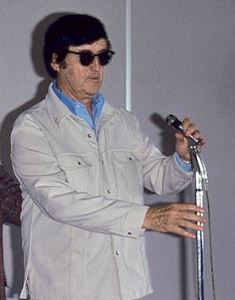|
The Hep Cat
''The Hep Cat'' is a 1942 Warner Bros. ''Looney Tunes'' cartoon directed by Bob Clampett, written by Warren Foster, animated primarily by Robert McKimson, and set to a musical score composed by Carl W. Stalling. The short was released on October 3, 1942. This cartoon was the first Technicolor ''Looney Tunes'' short. Plot ''The Hep Cat'' opens with a cat strolling through an abandoned lot. Unfortunately, he stumbles across a dog named Rosebud who gives chase. The cat, after a successful escape, begins singing a parody of "Java Jive". Later, the cat encounters an attractive female cat, and attempts to woo her, failing utterly. A package containing flowers and a lipstick-kissed note is tossed over the fence; the note invites the cat to rendezvous with "guess who?" on the other side of the fence. He prances over and comes face-to-face with Rosebud. The chase resumes. At one point, the dog uses a puppet version of the female cat of Hep Cat's dreams to trap him. The cat is fooled and a ... [...More Info...] [...Related Items...] OR: [Wikipedia] [Google] [Baidu] |
Bob Clampett
Robert Emerson Clampett Sr. (May 8, 1913 – May 2, 1984) was an American animator, director, producer and puppeteer. He was best known for his work on the ''Looney Tunes'' animated series from Warner Bros. as well as the television shows '' Time for Beany'' and '' Beany and Cecil''. He was born and raised not far from Hollywood and, early in life, showed an interest in animation and puppetry. After leaving high school a few months shy of graduating in 1931, he joined the team at Harman-Ising Productions and began working on the studio's newest short subjects, ''Looney Tunes'' and ''Merrie Melodies''. Clampett was promoted to a directorial position in 1937. During his 15 years at the studio, he directed 84 cartoons later deemed classic, and designed some of the studio's most famous characters, including Porky Pig, Daffy Duck and Tweety. Among his most acclaimed films are '' Porky in Wackyland'' (1938) and '' The Great Piggy Bank Robbery'' (1946). He left Warner Bros. Cartoon ... [...More Info...] [...Related Items...] OR: [Wikipedia] [Google] [Baidu] |
The Bob Clampett Show
''The Bob Clampett Show'' is an animated anthology television series which ran from 2000 to 2001. The show features animated theatrical shorts from the Warner Bros. library that were animated or directed by Bob Clampett, as well as a selection of shorts from the ''Beany and Cecil'' animated television series. It originally was produced by and aired on Cartoon Network, with reruns airing at the tail end of Cartoon Network's Adult Swim block in the mid-2000s. Twenty-six episodes were made in all. This was one of two animated anthology shows on Cartoon Network (joining ''The Popeye Show'') that aired uncut and uncensored shorts, as well as shorts that would normally get little to no airtime on American TV due to racially insensitive and outdated content (such as ''Russian Rhapsody'' and ''Bacall to Arms''), though ''Kristopher Kolumbus, Jr.'', the 1938 version of ''Injun Trouble'' (ironically, its color remake, ''Wagon Heels'' aired), and the Censored Eleven shorts ''Coal Black an ... [...More Info...] [...Related Items...] OR: [Wikipedia] [Google] [Baidu] |
Films Scored By Carl Stalling
A film also called a movie, motion picture, moving picture, picture, photoplay or (slang) flick is a work of visual art that simulates experiences and otherwise communicates ideas, stories, perceptions, feelings, beauty, or atmosphere through the use of moving images. These images are generally accompanied by sound and, more rarely, other sensory stimulations. The word "cinema", short for cinematography, is often used to refer to filmmaking and the film industry, and to the art form that is the result of it. Recording and transmission of film The moving images of a film are created by photography, photographing actual scenes with a movie camera, motion-picture camera, by photographing drawings or miniature models using traditional animation techniques, by means of computer-generated imagery, CGI and computer animation, or by a combination of some or all of these techniques, and other visual effects. Before the introduction of digital production, series of still imag ... [...More Info...] [...Related Items...] OR: [Wikipedia] [Google] [Baidu] |
Looney Tunes Shorts
{{Disambi ...
Looney or loonie may refer to: People * Looney (surname) * Looney or lunatic, antiquated term for mentally ill person * LoOney (born 1980), Serbian singer-songwriter, actor, director and comic artist * Looney, nickname of William Hinde (1900–1981), British Army major general * Looney, nickname of Rudy Williams (1909–1954), American jazz saxophonist Other uses * '' The Looney: An Irish Fantasy'', a 1987 comic novel by Spike Milligan * "Looney", an early version of the poem " The Sea-Bell" by J. R. R. Tolkien * '' Loonies'', 2002 Dutch family film * Loonie, common name for the Canadian one dollar coin, which bears an image of the loon * Looney Labs, a small company known for the Fluxx line of card games See also * '' Looney Tunes'', a Warner Bros. animated cartoon series * Luni (other) * Loney (other) Loney may refer to: *Loney (name) *''The Loney'', 2014 novel by Andrew Michael Hurley See also * *Looney (other) {{dab ... [...More Info...] [...Related Items...] OR: [Wikipedia] [Google] [Baidu] |
1942 Films
Year 194 ( CXCIV) was a common year starting on Tuesday (link will display the full calendar) of the Julian calendar. At the time, it was known as the Year of the Consulship of Septimius and Septimius (or, less frequently, year 947 ''Ab urbe condita''). The denomination 194 for this year has been used since the early medieval period, when the Anno Domini calendar era became the prevalent method in Europe for naming years. Events By place Roman Empire * Emperor Septimius Severus and Decimus Clodius Septimius Albinus Caesar become Roman Consuls. * Battle of Issus: Septimius Severus marches with his army (12 legions) to Cilicia, and defeats Pescennius Niger, Roman governor of Syria. Pescennius retreats to Antioch, and is executed by Severus' troops. * Septimius Severus besieges Byzantium (194–196); the city walls suffer extensive damage. Asia * Battle of Yan Province: Warlords Cao Cao and Lü Bu fight for control over Yan Province; the battle lasts for over 100 days ... [...More Info...] [...Related Items...] OR: [Wikipedia] [Google] [Baidu] |
Old Gold (cigarette)
Old Gold is an American brand of cigarette owned and manufactured by the R. J. Reynolds Tobacco Company. History Old Gold was introduced in 1926 by the Lorillard Tobacco Company and, upon release, would become one of its star products. By 1930, with the aid of a campaign from Lennen & Mitchell that featured exuberant flappers and the slogan ''"Not a cough in a carload"'', Old Gold won 7% of the market. During the 1930s, Lennen & Mitchell built the Old Gold brand on radio by advertising in music programming targeting young people. In 1941, Lorillard moved the Old Gold account to J. Walter Thompson Co., which changed the brand's slogan to ''"Something new has been added"''. On TV, in the 1950s, Old Gold was known for its dancing cigarette packages (women wearing white boots and Old Gold packages), which tapped in time to an Old Gold jingle. Lennen & Mitchell also handled TV for Old Gold. In 1953, Lorillard began advertising king-size Old Gold side by side with the standard brand. ... [...More Info...] [...Related Items...] OR: [Wikipedia] [Google] [Baidu] |
Jerry Colonna (entertainer)
Gerardo Luigi Colonna (September 17, 1904 – November 21, 1986), better known as Jerry Colonna, was an American musician, actor, comedian, singer, songwriter and trombonist who played the zaniest of Bob Hope's sidekicks in Hope's popular radio shows and films of the 1940s and 1950s. He also voiced the March Hare in Disney's 1951 animated film '' Alice in Wonderland.'' With his pop-eyed facial expressions and large handlebar moustache, Colonna was known for singing loudly in what Gerald Nachman called a "comic caterwaul", and for his catchphrase, " Who's Yehudi?", uttered after many an old joke, though it usually had nothing to do with the joke itself. The line was believed to be named for violin virtuoso Yehudi Menuhin, and "the search for Yehudi" became a running gag on Hope's show. Colonna played a range of nitwitted characters, the best-remembered of which was a moronic professor, of which Nachman wrote: :Colonna brought a whacked-out touch to Hope's show. In a typica ... [...More Info...] [...Related Items...] OR: [Wikipedia] [Google] [Baidu] |
Catch Phrase
A catchphrase (alternatively spelled catch phrase) is a phrase or expression recognized by its repeated utterance. Such phrases often originate in popular culture Popular culture (also called mass culture or pop culture) is generally recognized by members of a society as a set of practices, beliefs, artistic output (also known as, popular art or mass art) and objects that are dominant or prevalent in ... and in the arts, and typically spread through word of mouth and a variety of mass media (such as films, internet, literature and publishing, television, and radio). Some become the de facto or literal "trademark" or "signature" of the person or character with whom they originated, and can be instrumental in the typecasting of a particular actor. Catchphrases are often humorous, but are never long enough or structured enough to be jokes in themselves. However, a catchphrase can be (or become) the punchline of a joke, or a reminder of a previous joke. Culture According to ... [...More Info...] [...Related Items...] OR: [Wikipedia] [Google] [Baidu] |
Victor Mature
Victor John Mature (January 29, 1913 – August 4, 1999) was an American stage, film, and television actor who was a leading man in Hollywood during the 1940s and 1950s. His best known film roles include ''One Million B.C.'' (1940), ''My Darling Clementine'' (1946), ''Kiss of Death'' (1947), '' Samson and Delilah'' (1949), and '' The Robe'' (1953). He also appeared in many musicals opposite such stars as Rita Hayworth and Betty Grable. Early life Mature was born in Louisville, Kentucky. His father, Marcello Gelindo Maturi, later Marcellus George Mature, was a cutler and knife sharpener from Pinzolo, in the Italian part of the former County of Tyrol (now Trentino in Italy, but at that time part of the Austro-Hungarian Empire). His mother, Clara P. (Ackley), was Kentucky-born and of Swiss heritage. An older brother, Marcellus Paul Mature, died of osteomyelitis in 1918 at age 11. His only sister, Isabelle, born and died in 1906. Victor attended St. Xavier High School in Louisville, ... [...More Info...] [...Related Items...] OR: [Wikipedia] [Google] [Baidu] |
Porky Pig
Porky Pig is an animated character in the Warner Bros. '' Looney Tunes'' and '' Merrie Melodies'' series of cartoons. He was the first character created by the studio to draw audiences based on his star power, and the animators created many critically acclaimed shorts featuring the character. Even after he was supplanted by later characters, Porky continued to be popular with moviegoers and, more importantly, the Warners directors, who recast him in numerous everyman and sidekick roles. He is known for his signature line at the end of many shorts, "Th-th-th-that's all, folks!" This slogan (without stuttering) had also been used by both Bosko and Buddy and even Beans at the end of Looney Tunes cartoons. In contrast, the Merrie Melodies series used the slogan: ''So Long, Folks!'' until the mid-1930s when it was replaced with the same one used on the ''Looney Tunes'' series (when Bugs Bunny was the closing character, he would break the pattern by simply saying, in his Brookl ... [...More Info...] [...Related Items...] OR: [Wikipedia] [Google] [Baidu] |




